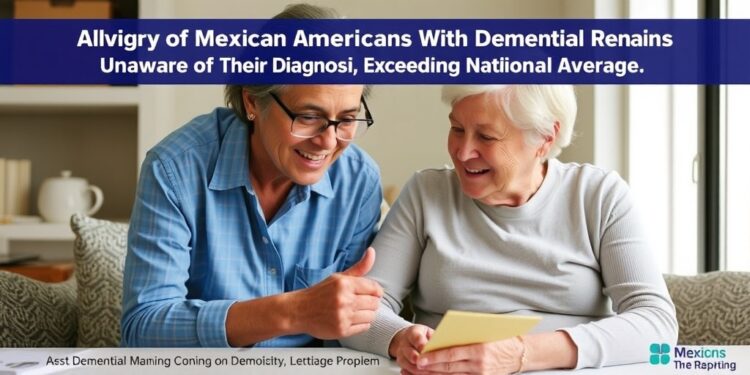
A recent study conducted by researchers at the University of Michigan has revealed a troubling statistic concerning dementia awareness among older adults. The study found that more than three-quarters of individuals diagnosed with dementia are often unaware of their condition. This lack of awareness serves as a significant public health concern, particularly in the context of treatment and care strategies that rely heavily on an informed patient population. Strikingly, among Mexican American participants, this figure rises dramatically to as high as 85%. This demographic represents the largest portion of the Hispanic and Latino population in the United States, highlighting an urgent need to address the gaps in diagnosis and care within this community.
The study tracked older adults classified as having probable dementia based on cognitive assessments in Nueces County, Texas. Only a minimal percentage—less than 7%—reported not having a primary care provider, which raises questions about the effectiveness of current physician-patient communication strategies related to dementia diagnosis. The researchers determined that the awareness gap was not significantly correlated with access to healthcare. Thus, the conundrum lies not in the absence of healthcare access but rather in the dynamics of doctor-patient interactions.
Senior author Lewis Morgenstern, an eminent figure in neurology and public health, expressed concern regarding this phenomenon, remarking that awareness—or the lack thereof—represents a missed opportunity for better healthcare interventions. The diagnosis of dementia brings with it various avenues for treatment and support, highlighting the importance of ensuring that patients and their families are adequately informed about the condition. Failure to provide this critical information not only compromises patient well-being but also places an additional burden on caregivers who may struggle without understanding the challenges that accompany dementia.
One potential explanation for the unawareness identified in the study is the patient-physician relationship itself. First author Josh Martins-Caulfield noted that physicians may sometimes refrain from giving a dementia diagnosis, often citing reasons such as time constraints and insufficient training in dementia care. This discomfort can lead doctors to avoid initiating conversations about memory issues unless prompted by the patients or their families. Leveraging improved communication strategies and enhancing diagnostic training could prove vital in bridging the awareness gap.
The study aligns with several previous research findings indicating that many older adults in the U.S. go undiagnosed or remain unaware of their dementia diagnosis. A 2018 report found that Hispanic and Latino adults, in particular, were frequently undiagnosed, thus drawing attention to a systemic issue within healthcare that extends beyond mere statistics. Cultural competence in healthcare is essential for effectively managing diseases that carry significant stigma, such as dementia.
Interestingly, despite the diagnosis high not reducing their perceived burden, caregivers of those diagnosed with dementia experience significant levels of stress and anxiety. The formal diagnosis often thrusts caregivers into a state of immediate responsibility, forcing them to grapple with the complex realities of caregiving. These challenges include making critical decisions regarding the loved one’s care and managing their daily needs, all of which can be tremendously stressful for caregivers who are already balancing their familial obligations and personal lives.
Caregiving for dementia patients is an arduous task, and many caregivers report feeling overwhelmed, particularly when they struggle to find the resources and support they need. According to co-author Darin B. Zahuranec, effective care is contingent upon not only an accurate diagnosis but also access to emotional support and guidance for caregivers. The study underscores the necessity of creating a more supportive framework for caregivers, which includes educational resources, community support, and mental health services.
Despite the growing body of research highlighting these issues, many physicians remain hesitant to initiate conversations surrounding dementia due to perceived challenges in clinical practice. The need for further training and resources for healthcare providers becomes apparent, especially as awareness gaps continue to persist. Improving patient-physician communication techniques could hold the key to fostering a better understanding of dementia among patients, thus ensuring they receive the care they deserve.
The funding for this pivotal study was provided by the National Institute of Neurological Disorders and Stroke as well as the National Institute on Aging, both entities within the National Institutes of Health. Their support highlights the importance of research that delves into public health challenges—specifically issues affecting marginalized communities, which often face significant barriers to accessing adequate healthcare.
The findings of this study have far-reaching implications for public health policy, healthcare practices, and community engagement. Addressing the systemic issues that lead to underdiagnosis and a lack of awareness requires a multifaceted approach that encompasses cultural competence, improved physician training, and better patient education. These steps will not only benefit individuals diagnosed with dementia but also their caregivers, ensuring a more holistic approach to care that recognizes the challenges posed by this condition.
This study marks a significant contribution to our understanding of dementia awareness among older adults and the implications for caregivers. As these issues become increasingly recognized, the hope is that healthcare providers will be better equipped to diagnose and communicate effectively with patients and their families. The urgency of this matter cannot be overstated, particularly given the growing aging population in the United States and the corresponding rise in dementia cases that will need attention in the years to come.
In conclusion, the study sheds light on a crucial yet often overlooked aspect of dementia care: the awareness gap that exists among those diagnosed. Moving forward, it is imperative for the healthcare system to implement necessary changes to facilitate better communication, education, and support for both patients and their caregivers to ensure they are not left navigating the challenges unprepared.
Subject of Research: Dementia diagnosis unawareness and caregiver burdens
Article Title: Dementia diagnosis unawareness and caregiver burden in a multi-ethnic cohort
News Publication Date: 14-Jan-2025
Web References: http://dx.doi.org/10.1007/s11606-024-09333-1
References: N/A
Image Credits: N/A
Keywords: Dementia, Medical diagnosis, Ethnicity, Older adults, Public health, Caregivers, Home care, Aging populations, Neurological disorders





